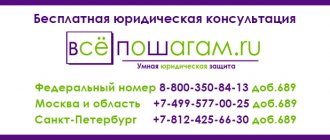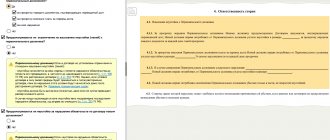Can an interest-free loan be issued to another organization?
Yes, this possibility is provided for by the Civil Code.
According to Art. 808 of the Civil Code of the Russian Federation, a loan agreement between legal entities must be concluded on paper. It is also necessary to state that there is no interest on a cash loan, since otherwise, by default, the loan fee should be calculated based on the refinancing rate on the date of repayment of the loan or part thereof (clause 1 of Article 809 of the Civil Code of the Russian Federation). If the subject of the agreement is things, then such an agreement will be considered interest-free if there is no mention of this condition in it. When completing such transactions, the accountant is faced with the question of the tax consequences of an interest-free loan between legal entities. This is discussed in the next section, where we only talk about agreements between companies independent of each other, those that do not fall under the terms of Art. 105.1 Tax Code of the Russian Federation.
ConsultantPlus experts told us how to conclude a cash loan agreement between legal entities. Get trial access to the system and upgrade to the Ready Solution for free.
Main points in the loan agreement for individual entrepreneurs
The following basic information must be entered into the document:
- date of preparation, serial number of the document;
- sides;
- subject of the contract. This should include the amount, currency of the debt, the amount of interest (if any), the period for repayment of the loan object, and other conditions as agreed by the parties;
- rights and obligations of the parties to the agreement;
- dispute resolution (in court, in arbitration);
- conditions for termination of the contract and liability arising from this;
- details, signatures of the parties.
There are documents that must be attached to the main contract. These include:
- repayment schedule for principal and accrued interest;
- act of acceptance and transfer of the object of the contract;
- additional agreements, etc.
Tax risks of interest-free loans between independent organizations
If the lender has received loans or borrowings on which he pays interest, then the tax authorities may consider it unlawful to accept such interest as expenses, since the funds received from the loan were used to issue an interest-free loan. It is advisable to challenge such decisions of tax authorities in court, proving that the loan was used for other purposes, and the interest-free loan was issued from one’s own funds. Examples: the resolution of the Federal Antimonopoly Service of the North-Western District dated July 1, 2015 No. F07-3688/15 is not in favor of the taxpayer, a positive decision in the resolution of the Federal Antimonopoly Service of the Ural District dated January 14, 2009 No. F09-10027/08-C3.
Can additional income be accrued to the lender by calculating it from the market rate on loans? For independent entities, the Tax Code of the Russian Federation does not contain rules obliging the accrual of abstract income on interest-free loans between legal entities, so the loan provider should not have any problems (letter of the Ministry of Finance of the Russian Federation dated August 11, 2011 No. 03-03-06/2/120).
Do tax authorities have the right to accrue additional income from a borrower-legal entity by analogy with the material benefit from a loan without interest? In the Tax Code of the Russian Federation, for income tax purposes, there is no concept of material benefit from an interest-free loan between legal entities. The Ministry of Finance also comments on the illegality of such additional charges, for example, in letter dated March 23, 2017 No. 03-03-RZ/16846. The tax authorities do not argue with this approach (letter from the Federal Tax Service of Russia for Moscow dated November 22, 2011 No. 16-15/ [email protected] ). But an interest-free loan between a legal entity and an individual, including individual entrepreneurs, has its own tax nuances within the framework of calculating personal income tax on material benefits.
Read about this in our article “How material benefits are taxed with personal income tax (rate).”
Find out about the tax consequences of an interest-free loan in the Typical situation from ConsultantPlus. Learn for free with a free trial of the legal system.
Interest-free loan between a legal entity and an individual
A transaction where an interest-free loan is given by an independent individual to an organization will not entail an increase in the tax burden on any of the parties to the transaction. Interest-free loans between an individual and a legal entity, including if the loan is provided by an individual entrepreneur, do not increase the taxable income of the borrower (see explanatory letters from government agencies from the previous section). For individuals, the Tax Code of the Russian Federation also does not contain any grounds for additional accrual of lost income.
In addition, the amount of the loan issued or repaid cannot be recognized as income for any party in accordance with subparagraph. 10 p. 1 art. 251 Tax Code of the Russian Federation. This is confirmed by court decisions, for example, resolution of the Federal Antimonopoly Service of the Ural District dated January 14, 2009 No. F09-10027/08-S3. The same applies to expenses: the amount of a loan issued or repaid is not an expense (Clause 12, Article 270 of the Tax Code of the Russian Federation).
Tax consequences of interest-free loans between related parties
If a transaction with an interest-free loan is carried out between organizations that are interdependent, then additional tax consequences arise in connection with Section V of the Tax Code of the Russian Federation.
Find criteria for interdependence here.
If the parties to a transaction are interdependent, the next step is to determine whether the transaction is controlled.
Our article “Criteria for controlled transactions - table” will help with this.
If the transaction does not fall under the criteria of a controlled one, and the parties to the transaction are Russian organizations or citizens, then they do not bear additional tax risks. If one of the interdependent parties is a foreign entity, then such a transaction automatically falls under the controlled ones (Article 105.14 of the Tax Code of the Russian Federation, letter of the Ministry of Finance of the Russian Federation dated September 4, 2015 No. 03-01-11/51070), and for this option - the next section of the article.
ATTENTION! As of 01/01/2017, a new tax rule is in effect. If a transaction involving an interest-free loan is carried out between interdependent legal entities that are registered on the territory of the Russian Federation, or with the participation of citizens of the Russian Federation, then it is not recognized as controlled (subclause 7, clause 4, article 105.14 of the Tax Code of the Russian Federation).
This means that the lender is now safe from additional income in the form of interest at the market rate. In the letter of the Ministry of Finance dated 04/21/2017 No. 03-12-11/1/24048, it is commented that the innovation is also valid for contracts concluded earlier than 01/01/2017, the main thing is that income and expenses on it are recognized after 01/01/2017.
Is notarization required?
When drawing up a DBZ, the question often arises: is the agreement required to be certified by a notary, or will a promissory note signed by the parties to the agreement be sufficient?
It should be noted that the legislative norms of the Russian Federation do not provide for notarized confirmation of the DBZ. However, if the parties do not really trust each other, then they can have the document certified by a notary. This is not prohibited by law.
If you limit yourself to a receipt, then if you fail to fulfill your debt obligations, you will have to go to court. In this case, it will be necessary to:
- Expert research on the receipt to prove the authenticity of the borrower’s handwriting, which will delay the repayment of the loan.
- Additional expenses.
- Other actions that will delay your refund.
Therefore, notarization of the DDBZ:
- It will help reduce the risk of non-repayment of borrowed funds.
- It will facilitate the procedure for returning a loan if the borrower fails to fulfill its obligations.
Tax consequences of interest-free loans in a controlled transaction
If the issued interest-free loan relates to a controlled transaction, for example, one of the parties is not a resident of the Russian Federation, then Art. 269 of the Tax Code of the Russian Federation. When calculating income tax, the lender must take into account income in the form of unearned interest. To calculate the amount of interest, it is necessary to take into account the requirements of clauses 1.1, 1.2 of Art. 269 of the Tax Code of the Russian Federation. The actual interest rate (FP) on the loan must be compared with the established interval (see table below).
| Type of loan | Interval |
| In rubles (place of registration, residence, tax residence of the parties - Russian Federation) | MIN = 0%, MAX = 180% of the refinancing rate of the Central Bank of the Russian Federation (for 2015), MIN = 75% to MAX = 125% of the key rate of the Central Bank of the Russian Federation (starting from 01/01/2016) |
| Other loans in rubles | MIN = 75%, MAX = 180% of the refinancing rate of the Central Bank of the Russian Federation (for 2015), MIN = 75% to MAX = 125% of the key rate of the Central Bank of the Russian Federation (starting from 01/01/2016) |
| In euros (in Chinese yuan, in pounds sterling) | MIN = EURIBOR (SHIBOR, LIBOR) + 4%, MAX = EURIBOR (SHIBOR, LIBOR) + 7% |
| In Swiss francs or Japanese yen | MIN = LIBOR + 2%, MAX = LIBOR + 5% |
| In other currencies | MIN = LIBOR (in dollars) + 4%, MAX = LIBOR (in dollars) + 7% |
The lender can recognize actual income on the loan if FP>MIN. The borrower may recognize the actual loan expense if FP<MAX. For an interest-free loan, the FI is equal to 0, therefore, we calculate taxable income at the minimum interval rate (MIN), the expense on the received interest-free loan will be equal to 0.
Postponement of the limitation period
In the event that the person who has the debt acknowledges it, the term is canceled and its calculation begins anew. Moreover, the time period that elapsed before recognition does not in any way affect the length of the new term.
Moreover, in the case when the borrower sends a notice to the lender that he is ready to repay the existing debt, his repayment period will be restored again to 3 years. Thus, if you have documents confirming the recognition of claims, you can receive a deferment an unlimited number of times. This means you can avoid having to enter the debt amount into the income section of your tax return.
The deferment of the limitation period may also be extended if the lender, in response to such a letter, sends a notice that it is extending the payment period. In this case, the reporting period will begin only after the expiration of the deferment date.
Accounting entries for interest-free loans
Postings for an interest-free loan depend on the other party to the transaction. An employee received an interest-free loan - accounting entries are made using account 73. If this is a third-party individual, then account 76. If a transaction on an interest-free loan is made between legal entities, then account 76 is also used. In entries for an interest-free loan issued to another organization, account 58 should not be used maybe, since a loan with a rate of 0 is not a financial investment. The table below lists possible accounting options for interest-free loan transactions between legal entities, as well as with individuals.
| Description | Dt | CT |
| Accounting with the lender | ||
| An interest-free loan was issued | 73.1, 76 | 51, 50 |
| Loan amount repaid | 51, 50 | 73.1, 76 |
| Personal income tax is withheld from the employee’s material benefit | 70 | 68 subaccount “NDFL” |
| PNO accrued if the transaction is recognized as controlled | 99 | 68 subaccount “Income tax” |
| Accounting with the borrower | ||
| Received an interest-free loan | 51, 50 | 66, 67 |
| Loan amount repaid | 66, 67 | 51, 50 |
Results
An interest-free loan between legal entities or between a citizen and an organization is completely legal. If the parties to such an agreement are independent persons or any Russian persons, then they will not bear an additional tax burden. Tax risks in such a transaction arise if it is recognized as controlled. Then the lender must accrue additional taxable income based on the requirements of the Tax Code of the Russian Federation.
Sources:
- Civil Code of the Russian Federation
- Tax Code of the Russian Federation
You can find more complete information on the topic in ConsultantPlus. Free trial access to the system for 2 days.
Leave a comment on the document
Do you think the document is incorrect? Leave a comment and we will correct the shortcomings. Without a comment, the rating will not be taken into account!
Thank you, your rating has been taken into account. The quality of documents will increase from your activity.
| Here you can leave a comment on the document “Loan Agreement (interest-free)”, as well as ask questions associated with it. If you would like to leave a comment with a rating , then you need to rate the document at the top of the page Reply for |







